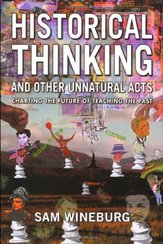
Wineburg asks us to consider that we will never appreciate historical context ie. Did the Egyptians see as we do but draw in a different or primitive manner or did the Egyptians simply see differently to us? Importantly can we learn anything from asking this question?
Secondly Wineburg notes that the good historian engages with the past through humility, knowledge of ignorance and with heart. What lessons might there be here for school history?
Can you see any of Wineburg’s concepts working in the history classroom? How might you have tackled re-writing that textbook? Do you agree with his conclusions on the place of history? And importantly, what relevance does this have in light of curriculum reforms? Or rather, does it matter if it has relevance or not?
Comments welcome…
Need a brain break now!!
Mr F
Unnatural and Essential – This article can be downloaded from the HA here: LINK
Historical Thinking and Other Unnatural Acts can be viewed with a JStor free account here: LINK

 RSS Feed
RSS Feed
